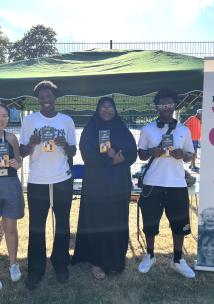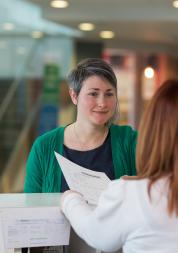Together We Prevent: Youth Participatory Action on HPV

Human Papillomavirus (HPV) is a sexually transmitted infection (STI) that can cause many health problems, including cervical cancer, genital warts, and cancers of the mouth, throat, and anus. The HPV vaccine is free for young people up to age 25, yet uptake across south-east London is lower than it could be. This report shares what young people in Greenwich, especially those in Thamesmead, told us about their understanding of HPV, their experiences of HPV vaccination, and the barriers that make it harder to feel confident about getting protected.
For many, HPV was an unfamiliar term. Even those who had been vaccinated often struggled to explain what the virus is, how it spreads, or why the vaccine is important. Confusion about risk and transmission was widespread, with some mistaking HPV for HIV or believing it could be caught through everyday contact. The lack of clear, consistent information meant that many relied on fragmented messages from schools, families, peers, and social media. HPV was often seen as something that affects women alone, reinforcing gendered assumptions that girls are responsible for sexual health while boys are not as directly at risk.
Parents played a central role in decision-making, but communication from schools with families on HPV vaccination was often minimal or inaccessible. In many cases, parents received only brief consent forms with little explanation. Young people described this as a ‘tick-box’ process that left some families uncertain and mistrustful. For parents who speak English as a second language or who are less confident engaging with schools or health services, this lack of communication deepened barriers and reinforced suspicion.
Within schools, opportunities to inform and prepare young people were often missed. Sexual health lessons were described as limited or inconsistent, and teachers themselves were sometimes unsure how to explain HPV or the purpose of vaccination. When vaccination day arrived, the experience was often stressful and impersonal, characterised by long queues, anxious peers, and little opportunity to ask questions or receive reassurance. For some, this experience left a lasting sense of fear or alienation towards preventive health programmes.
Cultural and social norms also shaped attitudes to HPV. Many young people said that sexual health is a difficult or even taboo topic, awkward to raise with friends, and sensitive within families. Myths about the HPV vaccine, particularly that it causes infertility, were widespread, more so among young women from global majority communities. For many, deciding to get vaccinated involved navigating not just personal beliefs, but questions of identity, loyalty, and belonging. In these contexts, health messages that emphasise individual choice can feel at odds with cultural expectations around modesty, family authority, or faith.
Experiences of the COVID-19 pandemic further complicated trust. Young people recalled rapidly changing messages about risk, rules, and vaccines, leaving them uncertain about what, and who, to believe. Some described feeling “talked at” and said the constant stream of pandemic information left them fatigued or cynical about all health campaigns. These feelings were strongest among communities who felt ignored or misrepresented during the pandemic and the legacy of suspicion of public institutions remains powerful. Overall, hesitancy about the HPV vaccine was rarely outright refusal. It was shaped by uncertainty, low awareness, practical hurdles, and a lack of opportunities to talk and learn.
Despite this, young people said they trust healthcare professionals more than any other health information source, yet few knew where to go for reliable information about HPV. Many were unsure whether to ask their GP, pharmacist, or sexual health clinic, and some felt embarrassed or anxious about raising questions. Access barriers such as inconvenient opening times, long waits, or intimidating environments made it harder to seek advice. For young women, the fear of being judged or misunderstood was a strong deterrent. Improving HPV awareness and uptake, therefore, requires more than simply sharing information.
Young people were clear about what would help: opportunities for open discussion, better communication between schools or vaccination services and parents, more inclusive messaging for both boys and girls, and services that feel approachable and youth friendly. Above all, they want to feel respected, listened to, and informed, not instructed. For young people, building trust through genuine engagement, cultural sensitivity, and equitable communication is key to enabling families and young people to have the information and confidence they need to make an informed choice.
Download the full report here
If you would like this report in a different format, please contact caitlin@healthwatchgreenwich.co.uk
